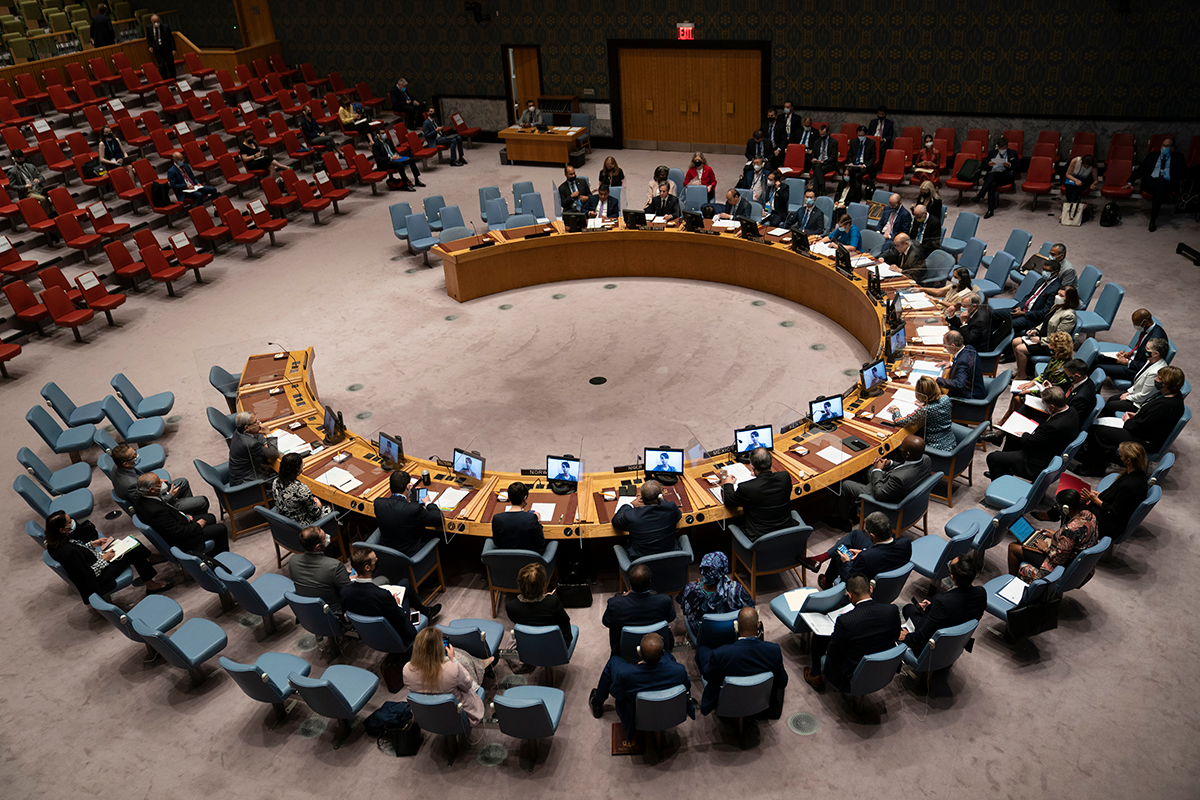

On Dec. 13, 2021 at a United Nations Security Council (UNSC) meeting, a draft resolution that would have recognized climate change as a security threat was rejected. The resolution, co-sponsored by Niger and Ireland, would have incorporated climate change as a security risk within the U.N. framework of conflict prevention strategies. Though widely supported by 113 member nations, vigorous debate at the council meeting yielded an outcome where although 12 of the 15 UNSC members supported it, the resolution was ultimately vetoed by Russia, with India voting no and China abstaining. Disagreements brought forth by Russia and India, respectively, hinged on technicalities associated with language in the resolution and whether the UNSC was the appropriate forum for it. The other council members that backed the resolution, including the United States and Tunisia, reflected that this rejection was another setback in the global effort to tackle climate change (with some members noting the inertia imposed on the council by vetoes). What are the potential implications of this and what comes next? We asked seven experts to weigh in with their thoughts.
Photo by John Minchillo - Pool/Getty Images
Viewpoints
-
Neeshad Shafi
Neeshad Shafi

Climate change is the ultimate threat to global security
Just a month after the conclusion of COP26, which produced what has been largely hailed as a good compromise (the Glasgow Climate Pact), came the news, on Dec. 13, 2021, that the United Nations Security Council (UNSC) failed to pass a draft thematic resolution on climate change and security.
Russia’s veto blocked the resolution, which was brought forward by Ireland and Niger. This veto was seen by many as a setback for the global climate change management agenda. While the draft resolution contained specific climate security actions, its main purpose was symbolic. It presented an opportunity to put the security implications of climate change firmly on the UNSC’s agenda. It echoed a similar event in 2020, when the U.S. halted a German push for U.N. climate conflict monitoring.
Though the proposed draft of the resolution had the support of 12 of the council’s 15 members, India voted against it and China abstained, arguing that the U.N. has more appropriate bodies, such as the U.N. Framework Convention on Climate Change, to address climate change. India stated that the issue does not belong on the UNSC’s agenda, where it could become politicized.
The power of a veto may have blocked this resolution, but it cannot hide the reality of the security risks posed by climate change.
Although the UNSC veto may seem like a step backward, the popular vote to support the resolution is actually encouraging: It shows that the detractors are the minority. The momentum behind climate security in the U.N. system is growing due to the harsh realities of climate change experienced by many countries, including those on the UNSC. Russia’s veto may have delayed official recognition in the UNSC, but it will not stop the growth of the U.N.’s work on this issue.
Going forward, the U.N. could bolster its work on climate change and security by strengthening the Climate Security Mechanism (CSM). Created in 2018, the CSM is a joint initiative of the U.N. Department for Political and Peacebuilding Affairs (DPPA), the United Nations Development Programme (UNDP), and the United Nations Environment Programme (UNEP) intended to enhance the U.N. system’s capacity to analyze and address the adverse effects of climate change on peace and security. Building on its own interagency setup, the CSM acts as a reference point on climate security for stakeholders across and beyond the U.N. The CSM’s priority areas of work include supporting risk analysis and response in the field, enhancing knowledge management and co-creation, strengthening partnerships and advocacy, and building capacity. The CSM has already achieved a lot: It has been a catalyst for building the evidence base for climate-related security risks and sharing related knowledge and practice among U.N. entities. However, more work is needed to encourage and prepare both U.N. peacekeeping operations and special political missions to identify and act on climate-related security risks.
Still, the UNSC leadership would be better able to address climate-related security risks by passing a thematic resolution. This may eventually happen, as the majority of member states agree that the members of the UNSC are responsible for maintaining international peace and security; it cannot and will not be able to ignore climate-related security risks. Clearly, a different approach is needed to create consensus among member states. Ultimately, addressing climate-related security risks is in the interest of all countries, including Russia and others opposed to the draft resolution.
The emerging global consensus is that climate change will stress the economic, social, and political systems that underpin every nation-state. Where institutions and governments are unable to manage the stress or absorb the shocks of a changing climate, the risks to the stability of states and societies will increase. Thus, climate change will be the ultimate threat multiplier, aggravating already fragile situations and potentially contributing to further social tensions and upheaval.
Neeshad Shafi is an environmentalist, and policy-oriented climate change advocate, as well as a non-resident scholar with MEI’s Climate and Water Program.
-
Iulia-Sabina Joja
Iulia-Sabina Joja

An important step, even if it fell short this time
Despite being vetoed, the December 2021 U.N. draft resolution on climate security was an important step on the path toward addressing the issue. Climate security remains relatively underexplored, even though most countries around the world have already experienced some security-related consequences of climate change.
The U.N. resolution would have made significant progress in taking stock of these consequences. Ireland and Niger’s initiative built on a proposal spearheaded by Germany and the E.U. in 2020. The draft resolution was structured on the premise that the effects of climate change, such as water scarcity, food insecurity, and population displacement, increase insecurity. The resolution requested the systematic integration of climate-related security risks into conflict prevention in two ways: conceptually, in the form of an assessment report by the U.N. secretary-general; and practically, into U.N. peace missions.
The findings of a global assessment would likely be far-reaching, revealing worldwide insecurity caused by environmental factors. Such an assessment would also likely reveal that larger developing countries with the highest greenhouse gas emissions have greater responsibility for climate change. For example, Russia, as one of the largest producers of oil and gas, has been criticized for insufficient efforts to reduce its carbon emissions. India’s vote against the December resolution, China’s abstention, and Russia’s veto illustrate the reluctance of some countries — especially the five BRICS — to go down what they see as the rabbit hole of climate security.
Though Russia’s veto is a setback for international efforts to address climate security, we should expect additional pressure on this front in the months and years to come. For starters, the E.U.’s ambitious climate goals now benefit from U.S. leadership and support under the Biden administration. Over the past year, the U.S. has undergone a radical shift from opposing a focus on climate security at the U.N., with Germany blaming the Trump administration for the lack of progress in 2020, to prioritizing it domestically and internationally under President Joe Biden.
Additionally, global pressure builds with every new example of the myriad ways in which climate change can create or exacerbate instability. Climate has been a contributing factor to the majority of conflicts worldwide over the last decade. Each major natural disaster with human security consequences will lead to increased pressure to make the climate-security nexus a priority at the global level, formalized under U.N. auspices.
Iulia-Sabina Joja is the director of MEI’s Frontier Europe Initiative, the project director of Afghanistan Watch, and an adjunct professor at Georgetown University.
-
Karim Elgendy
Karim Elgendy

Great power competition is complicating effective climate action
The unsuccessful United Nations Security Council (UNSC) vote was a setback for international attempts to preempt the impacts of climate change on global security, and to integrate the cascading impacts of climate change into the U.N.’s conflict prevention mechanism.
The thwarted effort to pass this resolution does not rule out a future attempt with an amended text. Yet, it underscores how great power competition creates different approaches to addressing the socio-economic and geopolitical impacts of climate change among UNSC members and beyond.
Notwithstanding the historic responsibility of different countries and the U.N. Framework Convention on Climate Change principle of Common But Differentiated Responsibilities, rising powers have long seen the global socio-economic impacts of climate change as both a risk and an opportunity to advance their grand strategies. Russia, for example, stands to gain from the disproportionate increase in temperatures across its frozen landmass, increase in agricultural land, and improved navigation along the Arctic sea. Similarly, China hopes to benefit from the shorter trade routes through the Arctic Circle. Its flagship Belt and Road Initiative is increasingly incorporating climate mitigation measures such as renewable energy projects into its growing infrastructure footprint.
Incumbent geopolitical and economic powers have also integrated climate action into their respective grand strategies. The EU’s Global Gateway strategy focuses on energy, transport, and digital connectivity, while the G7’s Build Back Better World — led by the United States — incorporates climate action into its vision.
For a fragile region such as the Middle East and North Africa where climate change is considered a threat multiplier, the lack of a coordination and conflict prevention mechanism — such as that which could have been created by the UNSC — is a cause for concern.
While no direct causal link has been established between climate and violent conflict, climate change impacts on agriculture, resource competition, and the deterioration of living conditions are all correlated with conflict, instability, and other forms of violence.
Increased competition for water resources caused by climate change is compounded by the fact that every country in the region shares at least a river or an aquifer with its neighbors, and by the lack of transboundary water management in some cases. Climate change could also exacerbate existing grievances by fueling political discontent, socio-economic tensions, and unrest, while its uneven impacts might align with existing rifts between communities.
Great power competition getting in the way of effective climate action is another cause for concern, especially in a region where external support is critical in providing the funding and technical capacity required for developing climate resilient infrastructure.
As global powers integrate their climate policies into their grand strategies, regional policy makers are more likely to find themselves having to make hard choices, and regional countries could end up aligning with different powers. This fragmentation not only creates disjointed infrastructure and undermines climate action and collaboration, but it also threatens to create competing regional visions, which — paradoxically — could increase regional tensions. Becoming an arena for great power competition would only replace one cause of instability with another, and is the last thing the region needs.
Karim Elgendy is an urban sustainability and climate consultant based in London and a non-resident scholar with MEI’s Climate and Water Program.
-
Ekaterina Arapova and Anita Mujumdar
Ekaterina Arapova and Anita Mujumdar


Russia: The climate agenda should avoid “excessive politicization”
On Dec. 13, 2021, Russia vetoed the United Nations Security Council (UNSC) resolution on climate change sponsored by Ireland and Niger.
Russia certainly supports the emerging global “Green Consensus,” and positions itself as one of the actors in the international climate regime. The country recognizes the need for environmental compliance at the national level and an adequate response to climate challenges, which directly determines the ability of the world community to meet the Sustainable Development Goals.
Russia has ratified the U.N. Framework Convention on Climate Change (UNFCCC) and the Kyoto Protocol. In 2009, Russia approved the Climate Doctrine. In 2019, the Russian government adopted the Paris Agreement and approved the Initial National Adaptation Plan for Climate Change for 2020-22. In November 2021, Russia approved a Long-Term Government Climate Strategy, targeting carbon neutrality by 2060.
However, Russia calls for revising the climate agenda to avoid what it refers to as its “excessive politicization.” It urges the idea of shared global responsibility in environmental politics, and promotes the exchange of best practices at the level of scientific organizations and technological institutions under the auspices of relevant U.N. institutions. The discussion of the global climate agenda should not result in increasing fragmentation of global environmental governance and aggravating global stratification.
According to the Russian position, climate-related issues should be covered by the UNFCCC. The UNSC does not have sufficient expertise on this issue, and "attempts to endow the structures of UN peacekeeping missions with unusual functions without qualified expertise are unconstructive and counterproductive."
In Moscow’s view, it’s unacceptable to establish a direct link between climate change and international security as a “central component” of U.N. strategies.
First, Russia argues that the adoption of a UNSC resolution does not take into account the interests of a significant part of the Global South. The UNSC does not reflect the U.N. membership and the interests of most developing countries as well. The proposed interpretation automatically shifts the responsibility for climate-related issues to the most vulnerable countries (the vast majority of which are developing ones), although “the socio-economic and environmental problems of these countries are often a consequence of the past colonial policy of Western countries.” Accordingly, the adoption of the resolution may curb the socio-economic growth of developing states, which are not represented in the UNSC. This Russian position was also supported by India.
Second, the adoption of the resolution at the level of the UNSC could potentially expand the range of coercive measures used against the most vulnerable countries. It can legitimize the military intervention of UNSC peacekeeping forces in the internal affairs of states, which Russia deems unacceptable. The adoption of the resolution may also contribute to the strengthening of the new sanctions regime. There has already been a trend toward environmental sanctions and enforcement of environmental offences. The adoption of the resolution will legitimize such sanctions regimes, and replace the desire to find effective collective responses to climate challenges with the counterproductive imposition of unilateral sanctions.
In response to the proposed initiative, Russia, India, and China submitted their own draft resolution on the Sahel region. The draft not only takes into account climate change issues, but “embraces the wide range of problems facing the region and aims to mobilize international efforts, including funding, to provide comprehensive assistance to those in need.”
Ekaterina Arapova is the director of the Center of Sanction Policy Expertise and head of the Department of Academic Development at the Institute for International Studies, MGIMO University.
Anita Mujumdar is a junior research fellow with the Center of Sanction Policy Expertise at the Institute for International Studies, MGIMO University.
-
Andrei Covatariu
Andrei Covatariu

Now is the right time to take action
In recent decades, the impact of climate change effects on security risks has not only increased, but the climate-security nexus has also become more complex: It is a link that continuously feeds itself.
The surge in the intensity and frequency of extreme weather events has reduced water availability and resulted in food security issues across the globe, driving an increase in rural-urban migration. While climate mitigation measures are needed to change extreme weather patterns, adaptation actions can help respond to climate migration in a timely fashion. However, most of the countries affected by these extreme weather events have limited financial means to adapt to climate risks. As a result, according to a recent report issued by the World Bank, by 2050 a staggering 216 million people could be internally displaced due to the effects of climate change.
Consequently, both reduced food resources in rural areas, as well as increased urban density and associated issues, could lead to a rise in populism, civil unrest, ethnic conflicts, or terrorism. Simmering domestic unrest will likely result in increased border tensions, creating a domino effect for security issues across regions and continents. As countries and multilateral organizations will be busy dealing with these security effects, little to no action will be focused on higher-level climate change issues. The situation could become a self-perpetuating cycle, creating and exacerbating long-lasting social and economic conditions that become harder to reverse as time goes on.
In December 2021 the U.N. Security Council rejected a resolution to classify climate change as a security risk, meaning that for now the climate-security nexus is only likely to become more entrenched. By contrast, efforts to mitigate security issues by addressing climate change impacts would help to strengthen global mitigation and adaptation strategies for climate action. Therefore, using the U.N.’s most powerful organ — the only U.N. body that can issue binding resolutions on member states — to address climate change is a critical step in ramping up existing climate commitments and reducing security-related risks. Now is the right time to take action to reach this milestone, especially in light of the relatively modest set of measures agreed upon at last year’s COP26 event in Glasgow.
Andrei Covatariu is a Co-founder of ECERA (Ecological Economics Research for Action), a network of practitioners aiming to produce policy-relevant knowledge on the various facets of sustainability. He was previously a Fellow with MEI’s Frontier Europe Initiative.
-
Malak Altaeb
Malak Altaeb

Climate and security resolution veto denies an alarming reality
After the U.N. Security Council (UNSC) failed to adopt a draft resolution on climate and security due to Russia's veto, Ambassador Geraldine Byrne Nason of Ireland reflected that the council had missed an opportunity to "recognize for the first time the reality of the world we live in." While the resolution may have been new, climate change has been an issue for the UNSC for years now, and there is growing evidence of its connection with problems as varied as conflict, food security, and migration.
India's Ambassador T. S. Tirumurti — who voted against the resolution — said his country prioritizes climate action but the UNSC is not the right forum to discuss this type of proposal, in part because it does not reflect the interests of developing countries.
Climate change is inextricably linked to society and impacts fundamental security dynamics, such as the linkage with trading systems. The security dimension also directly relates to the global energy transition away from carbon. In this transition, some countries will benefit, while others will lose out. Sectors will change, as will the political factors linked to them, and this will have an impact on the control of new resources.
When the draft resolution came up for a vote in the UNSC, some countries said that climate change should not be considered a political issue. In reality, it already is. This is playing out right now between Egypt and Ethiopia with the Grand Ethiopian Renaissance Dam controversy. Water scarcity and unequal access to resources directly threaten countries’ security, including but not limited to food security. Rural-urban migration and the growth of cities caused by environmental issues and climate change is another example.
We will likely have a situation soon when we will have to move people as a result of climate change, and the UNSC may have to respond to these human settlement issues in a global context. The impact on societies will be vast and it will present enormous challenges for countries on a variety of different levels, all of which underscores the direct connection between climate change and security, as well as the policies that are developed and implemented to deal with it.
Thus, the resolution on the nexus between climate change and security falls squarely within the purview of the UNSC and should have been adopted. The UNSC can manage the interdisciplinary nature of a challenge like climate change, but only with the right leadership. Its mandate is to maintain international peace and security, and that includes both taking preventive measures as well as dealing with the consequences. The threats to our world and people’s lives from climate change are all too clear and the UNSC needs to adopt a resolution that reflects that.
Malak Altaeb is a non-resident scholar with MEI’s Climate and Water Program and an independent consultant, writer, and researcher.











